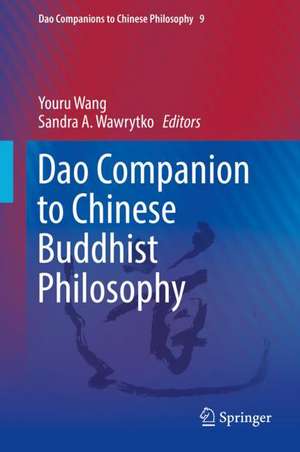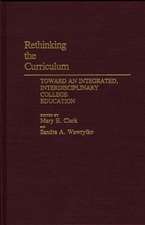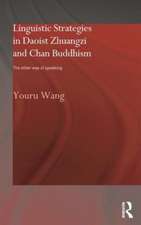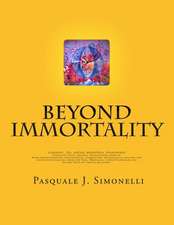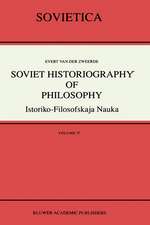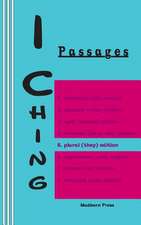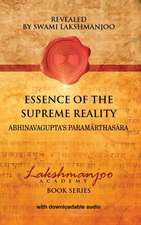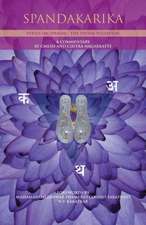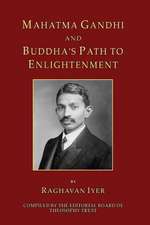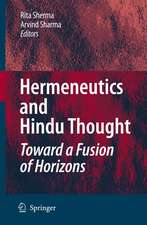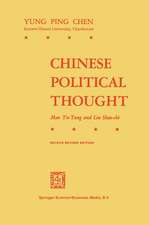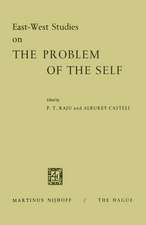Dao Companion to Chinese Buddhist Philosophy: Dao Companions to Chinese Philosophy, cartea 9
Editat de Youru Wang, Sandra A. Wawrytkoen Limba Engleză Hardback – 18 feb 2019
Din seria Dao Companions to Chinese Philosophy
- 18%
 Preț: 1827.00 lei
Preț: 1827.00 lei - 18%
 Preț: 954.93 lei
Preț: 954.93 lei - 18%
 Preț: 1011.77 lei
Preț: 1011.77 lei - 18%
 Preț: 1127.15 lei
Preț: 1127.15 lei - 18%
 Preț: 1033.23 lei
Preț: 1033.23 lei - 18%
 Preț: 956.03 lei
Preț: 956.03 lei - 18%
 Preț: 1131.40 lei
Preț: 1131.40 lei - 18%
 Preț: 969.93 lei
Preț: 969.93 lei - 24%
 Preț: 688.85 lei
Preț: 688.85 lei - 18%
 Preț: 807.96 lei
Preț: 807.96 lei - 18%
 Preț: 1242.35 lei
Preț: 1242.35 lei - 24%
 Preț: 784.82 lei
Preț: 784.82 lei - 18%
 Preț: 1119.56 lei
Preț: 1119.56 lei - 18%
 Preț: 954.45 lei
Preț: 954.45 lei - 15%
 Preț: 653.98 lei
Preț: 653.98 lei - 24%
 Preț: 1573.95 lei
Preț: 1573.95 lei - 18%
 Preț: 1128.08 lei
Preț: 1128.08 lei - 18%
 Preț: 1408.71 lei
Preț: 1408.71 lei
Preț: 1121.62 lei
Preț vechi: 1367.82 lei
-18% Nou
Puncte Express: 1682
Preț estimativ în valută:
214.65€ • 221.74$ • 178.64£
214.65€ • 221.74$ • 178.64£
Carte tipărită la comandă
Livrare economică 25 martie-08 aprilie
Preluare comenzi: 021 569.72.76
Specificații
ISBN-13: 9789048129386
ISBN-10: 9048129389
Pagini: 500
Ilustrații: XV, 440 p. 4 illus.
Dimensiuni: 155 x 235 mm
Greutate: 0.81 kg
Ediția:1st ed. 2018
Editura: SPRINGER NETHERLANDS
Colecția Springer
Seria Dao Companions to Chinese Philosophy
Locul publicării:Dordrecht, Netherlands
ISBN-10: 9048129389
Pagini: 500
Ilustrații: XV, 440 p. 4 illus.
Dimensiuni: 155 x 235 mm
Greutate: 0.81 kg
Ediția:1st ed. 2018
Editura: SPRINGER NETHERLANDS
Colecția Springer
Seria Dao Companions to Chinese Philosophy
Locul publicării:Dordrecht, Netherlands
Public țintă
ResearchCuprins
Introduction: The Acculturation of Buddhism in China.- Early Chinese Buddhists.- 1. Daoan (312-385), Huiyuan (334-426), Faxian; Whalen Lai.- Madhyamaka in the Three Treatises School (San-Lun).- 2. Sengzhao ; Kenneth Inada.- 3. Jizang; Ming-wood Liu.- The Yogacara School (Fa-xiang).- 4. Xuanzang and His Successors; Dan Lusthaus.- 5. "Awakening of Faith in the Mahayana"; Dale Wright.- The Tian-tai or White Lotus School (Fa-hua).- 6. Dacheng Zhiguan Famen (Method of Concentration and Insight); (Contributor: TBA).- 7. Zhiyi; Hans-Rudolf Kantor.- 8. Guanding (561-632) and Zhanran (711-782); David R. Loy.- The Avatamsaka or Flower Adornment School (Hua-yan).- 9. Fazang; Tao Jiang.- 10. Zongmi; Brook Ziporyn.- 11. Li Tongxuan; Jin Park.- The Dhyana School (Chan).- 12. The Northern School of Chan: Shenxiu and His legacy; John MacRae.- The Southern School of Chan.- 13. Hui-neng’s Revolution; (Contributor: TBA).- 14. Hongzhou school (Mazu Daoyi and Caoxi); Charles Muller.- 15. Linji School (Huangpo Xiyun and Linji Yixuan); Youru Wang.- 16. "Chan Epistemology in the Lankavatara Sutra: Laugh Once and See"; Sandra A. Wawrytko.- 17. The Pure Land School (Jing tu); Charles Wei-hsun Fu.- Later Developments.- 18. Neo-Confucianism and Buddhist Philosophy; Bryan W. Van Norden.- 19. Zhenke (1543-1603), Deqing (1546-1623), Zhixu (1599-1655); Jiang Wu.- Contributors.
Recenzii
“This comprehensive and thought-provoking account of Chinese Buddhist Philosophy that is as reliable as it is up-to-date. … the book makes up for its relative brevity by its vast scope and its analytical depth. … all the essential topics have been satisfactorily covered by the book. … it is an estimable work, and one can willingly agree with the editors … .” (Lehel Balogh, Religious Studies Review, Vol. 46 (1), March, 2020)
Notă biografică
Youru Wang is Professor at the Department of Philosophy and Religion Studies, Rowan University, USA. He got his PhD degree from Religion Department, Temple University, USA. His specialized area includes philosophical interpretations of Chan Buddhist thought, Chinese Buddhist thought and early Daoist thought, and comparative studies between Chinese philosophy/religious thought and Western philosophy/theology. His major publications include Linguistic Strategies in Daoist Zhuangzi and Chan Buddhism—the Other Way of Speaking (Routleldge 2003), Deconstruction and the Ethical in Asian Thought (ed.) (Routledge 2007), and Historical Dictionary of Chan Buddhism (Rowman and Littlefield 2017). His articles have appeared in leading journals in related academic fields. He is also a member of the editorial board for the Dao: A Journal of Comparative Philosophy published by Springer.
Sandra A. Wawrytko, B.A. in philosophy, Knox College; M.A. & Ph.D. in Philosophy, Washington University in St. Louis; Director of Center for Asian & Pacific Studies, and Professor in the Department of Philosophy, San Diego State University; specialization: Buddhist and Daoist epistemology and aesthetics in the context of neuroscience; plus over 30 years of experience traveling and teaching in Asia, including intensive summer classes in Buddhism at Tsung Lin University, Taiwan. Recent publications: “Buddhist Nondualism: Deconstructing Gender and Other Delusions of the Discriminating Mind,” in Chinese Philosophy and Gender Studies (Bloomsbury, 2016); Editor, Asian Thought and Culture series, Peter Lang (more than 60 volumes); forthcoming “Women on Love—Idealization in the Philosophies of Diotima (Symposium) and Murasaki Shikibu (The Tale of Genji),” Philosophy East and West, 2018. Recent research/course offerings include Global Aesthetics, Asian Models of Leadership, the Neuroscience of Buddhism, and Dissent through Sex and Satire.
Textul de pe ultima copertă
Too often Buddhism has been subjected to the Procrustean box of western thought, whereby it is stretched to fit fixed categories or had essential aspects lopped off to accommodate vastly different cultural norms and aims. After several generations of scholarly discussion in English-speaking communities, it is time to move to the next hermeneutical stage. Buddhist philosophy must be liberated from the confines of a quasi-religious stereotype and judged on its own merits. Hence this work will approach Chinese Buddhism as a philosophical tradition in its own right, not as an historical after-thought nor as an occasion for comparative discussions that assume the west alone sets the standards for or is the origin of philosophy and its methodologies. Viewed within their own context, Chinese Buddhist philosophers have much to contribute to a wide range of philosophical concerns, including metaphysics, epistemology, ethics, philosophy of language, philosophy of mind, and philosophy of religion, even though Western divisions of philosophy may not exhaust the rich contents of Chinese Buddhist Philosophy.
Caracteristici
A rare and serious approach to Chinese Buddhism as philosophy An examination of the process whereby Buddhism became grounded in China’s intellectual culture Reading and assessing the texts of Chinese Buddhism within the Chinese cultural context Highlights philosophical topics of interest to students of western philosophical tradition Addresses a growing need for both Chinese and non-Chinese to understand China’s rich thought and culture as a key player in global politics and economics
